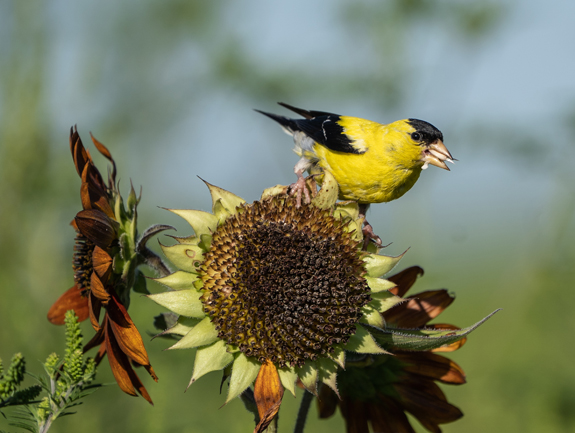Feeder activity is down and everyone’s asking: “Where are my birds?”
You’re not alone in asking this question! Everyone is seeing fewer birds at their feeders right now.
Don’t worry! A slowdown is normal for this time of year and temporary. Traffic at your feeder is likely to start picking up as we get further into Autumn. However, your fresh bath continues to be necessary for all wild birds whether seed-eater or non-seed-eater!
Hummingbird migrants are still coming through so keep feeders filled and nectar fresh. Keep them up until two weeks after your last sighting. (Feeders do not keep Hummingbirds from migrating!)
There are several factors overlapping right now to explain why your feeders aren’t attracting as many birds. It’s all about timing and seasonal events.+
Why this is normal:
- October brings a bounty of natural food sources.
It’s harvest time! We’ve entered the peak of Nature’s food production. Plants are going to seed and berries are still abundant. Insects have not yet gone dormant. Your birds are very happily eating food provided by natural habitats and the native plants and insects in your garden.This year, because we’ve had a recent long stretch of warm, dry weather, it’s possible there is even more food than usual. - Broods have dispersed.
All those juvenile birds are now winging their way alone and feeding independently. If you’re missing their squeaky voices and enthusiasm at your feeders, you’re not alone! - Migration.
Some of our favorite birds have quietly left the area, heading south to their winter homes. It’s always sad to see them go, but this year we are feeling even more bereft.
How we can help sustain wild bird populations, at home and at work:
- Create and maintain micro-habitats in our yards, which includes three simple elements, no matter the scale: Food, Water, Shelter. See our habitat resource pages for more info.
- Put decals on the outside of our windows.
It’s estimated that up to a billion wild birds per year die after crashing into glass. See The Cornell Lab of Ornithology’s recommendations ‘Why Birds Hit Windows—and How You Can Help Prevent It’. - Keep our cats indoors.
The Smithsonian Migratory Bird Center lists this as the No. 1 human-caused reason for the loss of birds, aside from habitat loss.
Backyard by backyard, all our micro-habitats are helping to make a difference.
Thank you for supporting our efforts here at the store, but most of all, thank you for supporting wild birds.
Debi, Mike and The Backyard Naturalist Team





